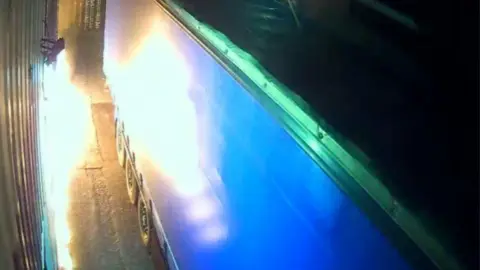From London Streets to the Frontlines: Unraveling the Wagner Group’s Arson Plot
In a chilling revelation of the shadowy tactics employed in modern conflicts, a sophisticated arson attack on a London warehouse, carried out by seemingly small-time criminals, has been directly linked to Russia’s mercenary force, the Wagner Group. The incident, which occurred just before midnight on March 20th last year, saw two individuals from South London deliberately set fire to a warehouse storing crucial communications equipment destined for Ukraine. The motive, however, was not ideological fervor, but cold, hard cash, highlighting a disturbing trend of mercenary-driven operations reaching into the heart of the UK.
The operation, orchestrated indirectly by the Wagner Group, was facilitated through a network of individuals, including a drug dealer from Leicestershire named Dylan Earl. Earl, along with four other men, has since been convicted for their roles in the arson, which resulted in approximately £1 million in damages. The investigation has shed light on the disturbing use of encrypted messaging platforms like Telegram, where individuals are recruited and tasked with acts of sabotage and violence across Europe.
Court documents revealed that Earl had been in contact with pro-Russian accounts on Telegram, even inquiring about fighting in Ukraine. However, his focus soon shifted to domestic operations. By March 16th, just four days before the attack, Earl was receiving instructions from a Telegram account identified as “Privet Bot,” a notorious entity linked to the Wagner Group known for inciting sabotage and violence. This account, which translates to “hello bot” in Russian, tasked Earl with surveilling the warehouse and its owners, labeling the occupants as “Ukrainian terrorists.”
The communication methods employed were covert, often using coded language and shortened phrases to evade detection by social media filters. Earl then contacted Jake Reeves, a cleaner at Gatwick Airport, through a Telegram group designed to connect criminals. Reeves, in turn, enlisted the help of Nii Mensah, who readily agreed to carry out the crime for financial gain, messaging Earl: “I’m down for da causee bro. 3 ppl and car.”
On the night of the attack, four individuals – driver Paul English, front passenger Ugnius Asmena, and rear passengers Nii Mensah and Jakeem Rose – set out from South London in a red Kia Piccanto. They traveled to the Cromwell Industrial Estate in Leyton, East London, where they targeted units one and two. These warehouses belonged to businesses involved in sending parcels and equipment to Ukraine, owned in part by British-Ukrainian businessman Mikhail Boikov.
The attack itself was executed with a degree of amateurism. While Mensah live-streamed the event to Earl via FaceTime, Rose poured petrol along the front of the warehouses and ignited it. In their haste, Rose inadvertently left behind a large knife bearing his DNA, a crucial piece of evidence for the authorities. Meanwhile, Yevhen Harasym, a truck driver attempting to sleep in a nearby lorry, heard the commotion and attempted to extinguish the flames with a fire extinguisher. Despite his efforts, the fire raged, destroying over £100,000 worth of goods, including vital Starlink satellite communication equipment that has proven instrumental on the Ukrainian frontlines.
Following the arson, Earl boasted about the successful operation to an online contact. However, his Wagner handler, Privet Bot, expressed dissatisfaction, criticizing the lack of coordinated action and suggesting a larger-scale fire would have been more effective. The handler even recommended Earl watch “The Americans,” a television series about deep-cover Soviet spies, to learn patience and strategic thinking.
Despite initial pay disputes, the group regrouped, and Earl was soon tasked with a new operation: targeting two businesses in West London owned by exiled Russian businessman Evgeny Chichvarkin. Chichvarkin, a former telecommunications magnate who had fallen afoul of Russian authorities, now runs the exclusive Hedonism Wines shop and the Michelin-starred Hide restaurant. The plot aimed to kidnap Chichvarkin and have him returned to Russia for imprisonment. A reconnaissance mission was carried out, but the plot was ultimately disrupted by counter-terrorism police.
The Wagner Group’s strategy extended beyond direct attacks, aiming to foster “partisan cells” across Europe and the UK, encouraging individuals to become “kindred spirits” in a wider campaign of destabilization. Earl, seeking to capitalize on his perceived leadership skills, offered his services for espionage operations targeting individuals, businesses, and even governments.
As the plans evolved, Earl involved more of his criminal associates, including Ashton Evans, a drug dealer from South Wales. Discussions revolved around the logistics of the operation, including the use of masks, gloves, and the necessity of avoiding traceable number plates. The potential for explosives was also mentioned, though fire was considered a viable alternative, with payment contingent on the extent of the damage.
By April 10th, Earl’s activities culminated in his arrest by counter-terrorism detectives. He subsequently pleaded guilty to preparing acts of serious violence on behalf of Russia, aggravated arson, and drug-related offenses. Reeves also pleaded guilty to agreeing to accept money from the Wagner Group and aggravated arson. The judge presiding over the trial remarked that such actions would have been described as “treason” in previous generations.
Nii Mensah, Jakeem Rose, and Ugnius Asmena were found guilty of aggravated arson, with Rose also admitting to possession of a knife. The driver, Paul English, was acquitted of all charges. Ashton Evans was convicted of failing to disclose information about the Mayfair plot but cleared of involvement in the warehouse arson. Another individual, Dmirjus Paulauskas, was acquitted of similar charges.
Commander Dominic Murphy of the Metropolitan Police’s Counter Terrorism Command highlighted the evolving threat landscape, noting that following the 2018 Salisbury nerve agent attack, the UK has become a “hostile operating environment” for state-sponsored malicious activities. This has led to a diversification of tactics, with entities like the Wagner Group increasingly recruiting younger individuals as proxies to carry out their operations.

